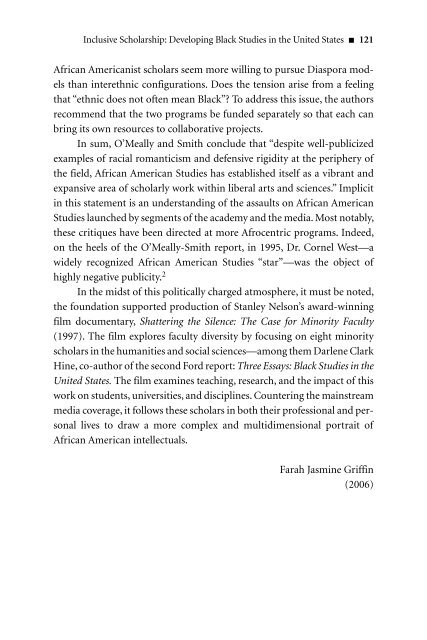Inclusive Scholarship: Developing Black Studies - Ford Foundation
Inclusive Scholarship: Developing Black Studies - Ford Foundation
Inclusive Scholarship: Developing Black Studies - Ford Foundation
You also want an ePaper? Increase the reach of your titles
YUMPU automatically turns print PDFs into web optimized ePapers that Google loves.
<strong>Inclusive</strong> <strong>Scholarship</strong>: <strong>Developing</strong> <strong>Black</strong> <strong>Studies</strong> in the United States 121<br />
African Americanist scholars seem more willing to pursue Diaspora models<br />
than interethnic configurations. Does the tension arise from a feeling<br />
that “ethnic does not often mean <strong>Black</strong>”? To address this issue, the authors<br />
recommend that the two programs be funded separately so that each can<br />
bring its own resources to collaborative projects.<br />
In sum, O’Meally and Smith conclude that “despite well-publicized<br />
examples of racial romanticism and defensive rigidity at the periphery of<br />
the field, African American <strong>Studies</strong> has established itself as a vibrant and<br />
expansive area of scholarly work within liberal arts and sciences.” Implicit<br />
in this statement is an understanding of the assaults on African American<br />
<strong>Studies</strong> launched by segments of the academy and the media. Most notably,<br />
these critiques have been directed at more Afrocentric programs. Indeed,<br />
on the heels of the O’Meally-Smith report, in 1995, Dr. Cornel West—a<br />
widely recognized African American <strong>Studies</strong> “star”—was the object of<br />
highly negative publicity. 2<br />
In the midst of this politically charged atmosphere, it must be noted,<br />
the foundation supported production of Stanley Nelson’s award-winning<br />
film documentary, Shattering the Silence: The Case for Minority Faculty<br />
(1997). The film explores faculty diversity by focusing on eight minority<br />
scholars in the humanities and social sciences—among them Darlene Clark<br />
Hine, co-author of the second <strong>Ford</strong> report: Three Essays: <strong>Black</strong> <strong>Studies</strong> in the<br />
United States. The film examines teaching, research, and the impact of this<br />
work on students, universities, and disciplines. Countering the mainstream<br />
media coverage, it follows these scholars in both their professional and personal<br />
lives to draw a more complex and multidimensional portrait of<br />
African American intellectuals.<br />
Farah Jasmine Griffin<br />
(2006)

















